Cheers erupted on the streets of Paris late Sunday as projected results suggested the left-wing New Popular Front (NFP) would beat the far-right National Rally (RN) party in France’s snap parliamentary election.
A large crowd later gathered at the capital’s Place de la République to celebrate the left-wing alliance winning the most seats in parliament as they chanted: “Young people screw the National Front,” a popular left-wing slogan.
The NFP is a cluster of several parties ranging from the far-left France Unbowed party to the more moderate Socialists and the Ecologists.
The alliance won 182 seats in the National Assembly, making it the largest group but short of the 289 required for an absolute majority, according to the French Interior Ministry.
Speaking to a crowd of his ecstatic supporters near Stalingrad square, Jean-Luc Mélenchon, the firebrand leader of France Unbowed, said the results came as a “huge relief for the overwhelming majority of people in our country.”
“Our people have clearly rejected the worst-case scenario,” Mélenchon said. “A magnificent surge of civic mobilization has taken hold!”
Late Sunday night, police cleared the Place de la République by firing tear gas into the crowds, mostly of young people.
But the demonstrators remained upbeat, with photos showing people across the city cheering and celebrating.
The mood was more somber for supporters of the far-right RN party.
At the Bois de Vincennes park in Paris, the buoyant atmosphere at a RN campaign event took a nosedive an hour before the polls closed as it became apparent the far right bloc would come third in the vote.
After the projection was announced, Jordan Bardella, the RN’s 28-year-old leader, said France had been thrown into “uncertainty and instability.”
Despite leading after the first round of votes, Marine Le Pen’s far-right National Rally (RN) party and its allies won 143 seats.
With no party close to clinching a majority, the parliament is likely to be paralyzed, split between three blocs.
The RN’s strong showing in the first round stirred fears that France could be on the cusp of electing its first far-right government since the collaborationist Vichy regime of World War II.
But Sunday’s results come as a huge upset and show French voters’ overwhelming desire to keep the far right from gaining power – even at the cost of a hung parliament.
President Emmanuel Macron’s centrist Ensemble alliance, which had slumped to a dismal third in the first round of voting last Sunday, mounted a strong recovery to win 163 seats.
Gabriel Attal, Macron’s protege, announced he would resign as prime minister Monday morning. He seemed to take a swipe at Macron’s decision to call the snap vote, saying he “didn’t choose” for France’s parliament to be dissolved.
After parliamentary elections, the French president appoints a prime minister from the party that won the most seats. Ordinarily, this means a candidate from the president’s own party. However, Sunday’s results mean Macron faces the prospect of having to appoint a figure from the left-wing coalition, in a rare arrangement known as a “cohabitation.”
Speaking to supporters near Stalingrad square, Mélenchon said Macron “has the duty to call the New Popular Front to govern.”




























